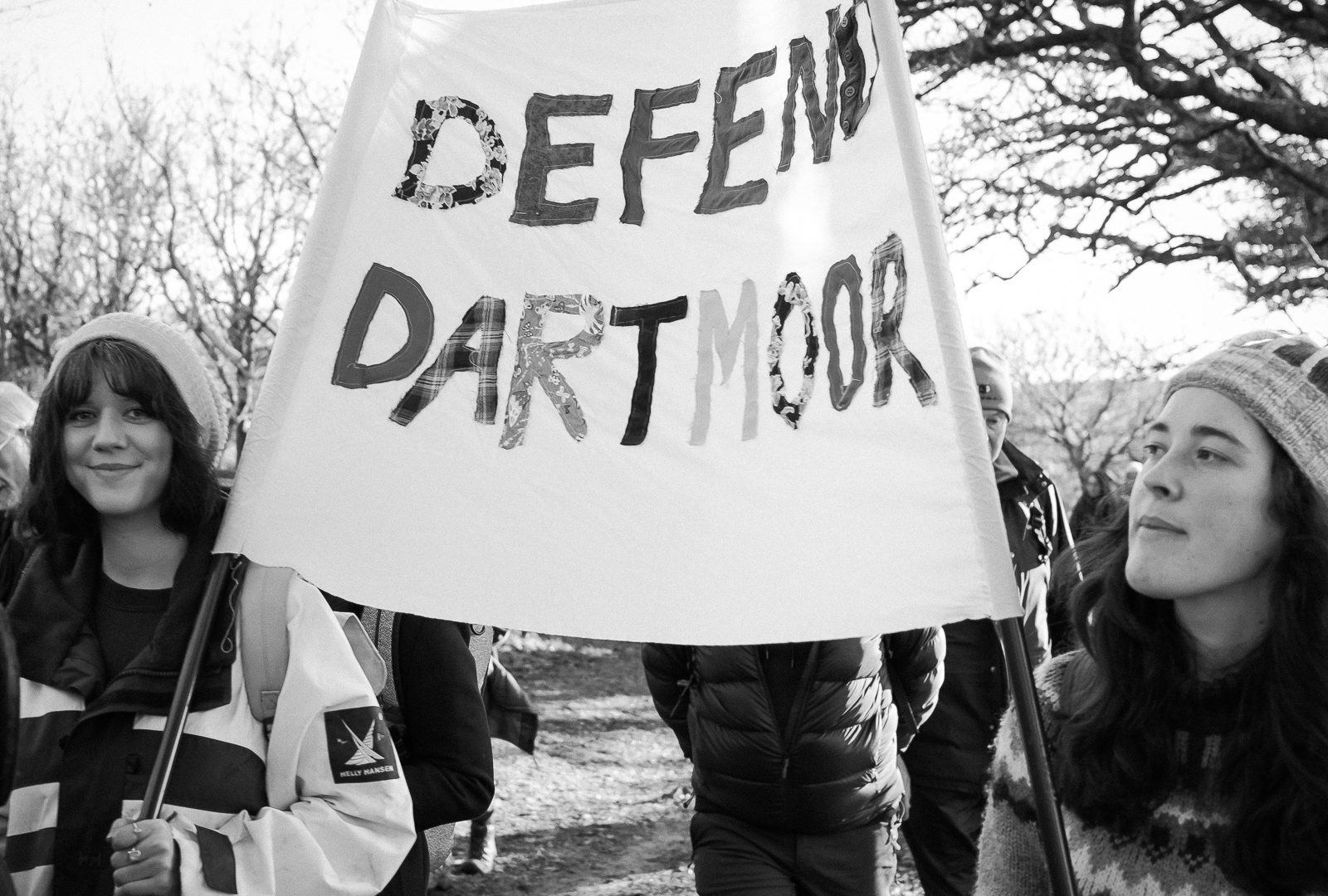
The Stars Are For Everyone

It was a bright and unusually warm January morning in the small village of Cornwood, on the southern edge of Dartmoor. People gathered in the street clutching home-made signs. One lady had travelled from Bristol with her grandson – “he becomes a different person when he’s outside. He’s transfixed with the idea of wild camping. When I heard the news I felt so strongly that I needed to be here”. Another family were sat on a wall pouring tea and hot chocolate from flasks. The father, Andrew, told me “Camping out on the moors was so incredibly formative for me as a young man – it saved me from some difficult times. I make every effort to get these guys experiencing that too – it’s vital that we protect this”.
Andrew was talking about the right to wild camp on Dartmoor – a custom with records dating back to the turn of the twentieth century and recognised, until a few days previous, by the Dartmoor bylaws since 1985. We had gathered in this tiny village to oppose a high court ruling in favour of Alexander Darwall – a wealthy landowner whose 4000 acre estate stretches up across Stall Moor, situated above the village. The rights were replaced with a permissive access arrangement between landowners and the Dartmoor National Park Authority, which sees a yearly renewed agreement enabling people to camp in certain areas of the moors, in exchange for the national park paying landowners a sum of public money.
“It’s an outrage – it makes me livid” said Jenifer, a Paignton resident who had recently disembarked one of the many shuttle busses bringing people from Ivybridge to Cornwood. “At first I thought, oh great we’ve got wild camping back – but then I realised that this deal they’ve cooked up is a stitch-up. Permission is so different to a right – we shouldn’t have to go begging for access to the countryside – to be able to sleep under the stars”.
On that day 3,500 people took to a remote part of Dartmoor to raise ‘Old Crockern’ the ancient sprit protector of the Dartmoor commons. It was in fact, the biggest land rights protest in England since the right to roam movement of the 1930s and the Kinder Scout Trespass which ultimately saw the the passing of the National Parks and Access to the Countryside Act 1949 which enabled the designation of National Parks.
It wasn’t just wild campers who took to Stall Moor in defiance of the ruling. One placard read ‘I don’t even like camping and I’m angry!’ Losing wild camping rights on Dartmoor – seen in an historical perspective – is not only a backwards step for recreational access to one of our most beloved of public spaces, but it also represents a continuation of enclosures which for centuries in England have chased people from the land, stripped them of their rights, and privatised the commons.
Wild campers were simply the latest target of interests which have sought to dominate the land and control ‘who belongs’ in the countryside. Amongst the banners and flags on Stall Moor was the Roma Wheel – the symbol of a people who have long been persecuted and cleared from land across Europe. Many other people shared stories of ‘micro-enclosures’ – the small-scale and often unseen fencing off of green spaces across the countryside, towns and cities – restricting access and diminishing people’s ability to know their local landscape. We all came with our own reasons to collectively shape an alternative narrative.
Up on Stall Moor, Dr Martin Shaw, Devon based storyteller addressed the crowd – “you’re all Old Crockern now – take that and hide it away somewhere in your mischievous little hearts” he said. As he finished speaking, over the hill came a cacophony of sound as the giant carnivalesque Old Crockern emerged into view – trailing garlands of fabric, towering against a dusky sky. People ran toward him and as he entered the crowd with a musician entourage, an atmosphere of celebration, jubilation and togetherness took hold. Tears filled my eyes.
As the sun set and people began to walk back down the lanes toward Cornwood and the waiting shuttle buses, it seemed that a part of a spell was broken – and in it’s place we’d begun to weave a new story of belonging and connectedness, of responsibility to land and to one another – and an intergenerational ethic which will determine who is welcome and who is not in future.
There’s a lot more work to do – but faced with heart-breaking defeat, we’ve turned this loss into an opportunity. The Dartmoor National Park Authority are seeking leave to appeal the ruling in the high court, and we’re continuing to campaign for greater access to the countryside, including the right to camp in other national parks. A new right to roam movement has been catalysed and with it we are turning the tide on access in England.
The stars, are indeed, for everyone.
Lewis Winks, Devon based writer and campaigner with The Stars Are For Everyone
The Dartmoor Preservation Association are raising funds to support the legal costs of appealing. You can donate to the fundraising efforts here.
